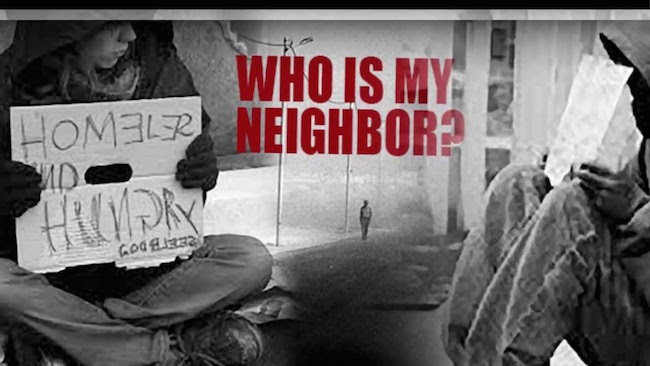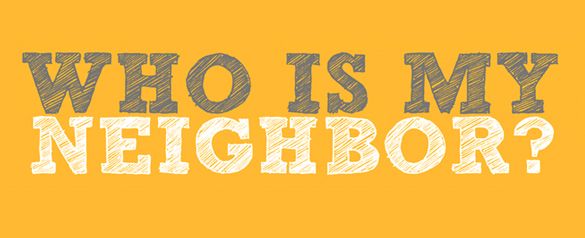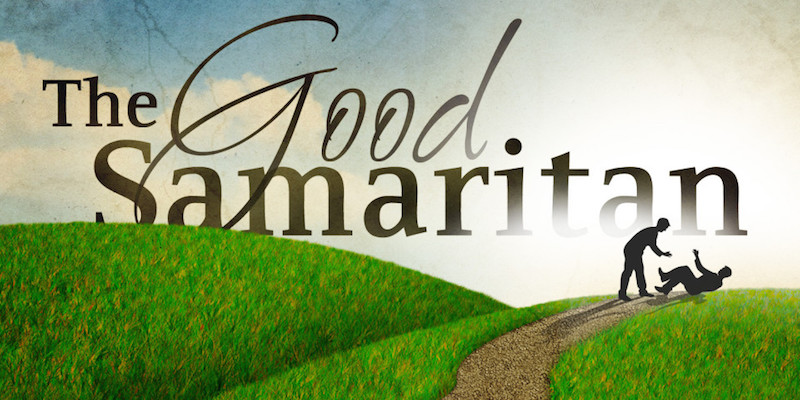Lev. 16:1 – Lev. 20:27
The story of The Good Samaritan is probably one of the most well-known stories from the New Testament. It is well-known because it teaches a principle of life that just about everyone in the world agrees with; it is good to show mercy and kindness to those in need! We don’t know if the story of the Good Samaritan actually occurred or not but to be honest, it doesn’t matter. Yeshua told the story of the Good Samaritan to answer a question, “Who is my neighbor?”
This question of “who is my neighbor?” was asked in a setting of dialogue with Yeshua when a certain lawyer (one who is an expert in the Law of Moses) asked Yeshua what he must do to inherit eternal life. Yeshua responded with a question in kind, “What is written in the Law? How does it read to you?” (Luke 10:26) The lawyer answered Yeshua by quoting a daily prayer of the Jewish people declaring the central belief of Judaism as found in the Law (Deut. 6:5):
“You shall love the LORD your God with all of his heart, with all of your soul, with all of your strength, and with all of your mind;” He then added the phrase, “and your neighbor as yourself” (Luke 10:27).
The expert in the Law proved himself to be more than someone who simply knows the Law, who also knew how to appropriate it in the right way. He was telling Yeshua that it is not enough to love God. Faith in God also demands that we love other people.
The Heart of the Law
The lawyer’s response shows us that the heart of the Law is to love God and love your neighbor. This command to “love your neighbor as yourself” is found in this week’s Torah Portion (Lev. 16:1 – Lev. 20:27). The Torah Portion itself begins with the Day of Atonement (Lev. 16), a day in which God permitted the sins of the whole community to be atoned for through various sacrifices both for the priest, the altar, the tent of meeting, and the people (Lev. 16:29-34). God has always made a way for people to come to Him and to have sin atoned for, as He still does today.
The book of Leviticus is the middle book of the Law, the third book out of the five books of Moses. Then in the middle of the book of Leviticus is the Day of Atonement followed by the command to “love your neighbor as yourself” a couple of chapters later (Lev. 19:18). The very heart of the Law, both literally and figuratively, are atonement and love. We are only able to love our neighbor because of the love of God and His provision of atonement for our sin. This is true from the beginning to the end, from the book of Genesis to the book of Revelation.
God is Love
To love others without first obtaining the love of God in our own lives is empty and void. It is the love of God that defines who we are and sets us free to love others. This point is clearly taught in the New Testament:
Beloved, let us love one another, for love is from God; and everyone who loves is born of God and knows God. The one who does not love does not know God, for God is love. By this the love of God was manifested in us, that God has sent His only begotten Son into the world so that we might live through Him. In this is love, not that we loved God, but that He loved us and sent His Son to be the propitiation for our sins. Beloved, if God so loved us, we also ought to love one another. – 1 John 4:7-11
Through the atoning sacrifice of Yeshua our sins have been cleansed and we are able to know the love of God and to love others. God is love and by knowing Him we are able to fulfill the command to love others.
Who is my neighbor?
To love God on the basis of His Law and atoning sacrifice with all of who we are and to love one’s neighbor as one’s self is the foundation for eternal life. Yeshua Himself told the lawyer that he had answered correctly and was on the right path to God, however, the lawyer wanted to make sure that he fulfilled the Law in the right way and asked for a point of clarification; “And who is my neighbor?” (Luke 10:29)
The expert in the Law asked a valid question. In order to fulfill the Law of loving one’s neighbor as oneself it must be clear who one’s neighbor is. Is a neighbor just someone who lives in an adjacent house or close by? Is a neighbor anyone we come into contact with? How do we define who the person is that we are to love? Who is my neighbor?
It is important to note that Yeshua believed that this question was valid enough to answer. He didn’t scold the lawyer for the question or ignore it, rather he engaged him and told him a story to illustrate His response.
The Good Samaritan
The story of the Good Samaritan is well-known but let’s look at it afresh together as there is always something new to learn. Yeshua told the story that a man was going down from Jerusalem to Jericho (Luke 10:30). The terrain from Jerusalem to Jericho is what is known as the wilderness of Judea. It is desert foothills that descend from a height of about 2400 feet (850 meters) above sea level in Jerusalem to a depth of approximately 1200 feet (400 meters) below sea level into the Jordan Valley. It is basically a desolate desert mountain pass from Jerusalem to Jericho. I have travelled this route numerous times by car and bus and once on foot. It is harsh and dangerous territory, even today.
Yeshua told the story that the man traveling this route fell among robbers. He was beaten, stripped, and left for dead. A priest happened to be traveling down that same road and saw the man but chose to do nothing. A Levite also passed by and saw the man but passed by on the other side and chose to do nothing. Finally, a Samaritan who journeyed on the same road saw the man, felt compassion for him, and did what he could to bandage the man. He then put him on his own donkey, took him to an inn, and continued to take care of him there. The Samaritan then paid the inn keeper a reasonable sum of money (two denarii) to look after the man. The Samaritan also told the innkeeper that if there was any further debt that he would repay it on his return (Luke 10:30-35).
At the conclusion of the story Yeshua then asked the expert in the Law which of the three proved to be a neighbor to the man who had fallen into the hands of robbers. The lawyer replied, “The one who showed mercy toward him.” And Yeshua said to the lawyer, “Go and do the same” (Luke 10 :36-37).
Being a Good Neighbor
The story that Yeshua told the lawyer was so simple and clear that even a child could understand it. At the same time, however, it is interesting to note that Yeshua didn’t answer the lawyer’s question directly regarding “Who is my neighbor?” Instead of explaining to the lawyer who his neighbor is, Yeshua told the man to be the neighbor that shows love to another. In essence, it doesn’t matter who the neighbor is, we are to love and show kindness to the people who are on our path during this journey of life. We are to be a good neighbor to the one in need.
Why the Story of the Good Samaritan?
Is there a reason that Yeshua decided to tell this particular story with all of its details to illustrate who the neighbor is? I believe Yeshua had good reasons for telling this particular story to this expert in the Law.
In going back to the book of Leviticus chapter 19 where the verse containing the command to “love your neighbor as yourself” occurs (Lev. 19:18), there are actually a few verses surrounding this verse that give us more instructions about “the neighbor.” Verse sixteen of chapter 19 reads this way: “You shall not go about as a slanderer among your people, and you are not to act against the life of your neighbor; I am the Lord” (Lev. 19:16). The first part about not going about as a slanderer is quite clear. The second part of this verse says: “you are not to act against the life of your neighbor.” The Hebrew literally reads as follows in the second part of this verse: “לא תעמוד על־דם רעך אני יהוה” which is literally translated as: “Do not stand on the blood of your neighbor, I am the LORD.” So what does it mean “to not stand on the blood of your neighbor?”
In one of the Jewish commentaries that I read about this verse in Leviticus 19, I came across the following interpretation: the Torah mandates “that a person is forbidden to stand idly by when a neighbor’s blood is being shed… Jews may not be passive when they see another drowning, attacked by robbers, or mauled by wild beasts” (Israel Drazin & Stanley M. Wagner, Onkelos on the Torah, Leviticus. p. 151). To stand by idly when a person is suffering is forbidden by the Law. God had mandated in the Law that we are to be good neighbors and be proactive in our position towards others, as long as it is in our ability to help.
In understanding Lev. 19:16 in context we can see that Yeshua was tying together how to love one’s neighbor with not “walking over the blood of one’s neighbor” as commanded in the Law. To love one’s neighbor is to show mercy and kindness to those in need, especially doing all we can to help a person that has been victimized.
Yeshua also took the story one step further and made sure that the expert in the Law didn’t miss the point that the ethnicity of the person should never be a hindrance or a barrier, just as the Samaritan took pity on the man on the road. Samaritans and Jews were not friendly toward one another in Yeshua’s day (John 4:9) and Yeshua made it clear that people are people whoever they are and we need to love everyone.
The Uniting of Jew and Gentile
In the command to “love your neighbor as yourself” (Lev. 19:18) and the story of The Good Samaritan I believe we see the love of God for all of mankind, Jew and Gentile alike. In Jewish Israeli culture there is sometimes an attitude of being the “chosen people” and that somehow Jews are better than Gentiles. The slogan “Love every Jew” is seen quite frequently on bumper stickers here in Israel. It is good to love our fellow Jews but what about the Arabs and Gentiles in our midst?
In this week’s Torah Portion there is a crystal clear teaching on this issue: “The stranger who resides with you shall be to you as the native among you, and you shall love him as yourself; for you were aliens in the land of Egypt: I am the LORD your God” (Lev. 19:34). There is no room for a double standard among the Jewish people. God loves all the world and He has commanded us to do the same.
Restoring the Tabernacle of David
The correlating Scriptures to the Torah Portion from the prophets this week is taken the books of Amos and Ezekiel. The section in Amos is taken from chapter 9, the last chapter. The verses in Amos chapter 9 are clearly Messianic and speak of the future restoration of the Jewish people and the Land of Israel. More than this, these verses in Amos speak of the grafting in of the Gentile nations (Amos 9:11-12).
In fact, the Apostle James in the book of Acts quotes directly from these verses in Amos 9 proclaiming that they were beginning to be fulfilled in his day:
After they had stopped speaking, James answered, saying, “Brethren, listen to me. Simeon has related how God first concerned Himself about taking from among the Gentiles a people for His name. With this the words of the Prophets agree, just as it is written,
‘After these things I will return,
And I will rebuild the tabernacle of David which has fallen,
And I will rebuild its ruins,
And I will restore it,
So that the rest of mankind may seek the Lord,
And all the Gentiles who are called by My name,’
Says the Lord, who makes these things known from long ago. – Acts 15:13-18
The restoration of the “Tabernacle of David” is the heart of God to see all nations worship Him, Jew and Gentile alike. God is love and His love is available to all who will call on Him and are called by His Name!
The love of God for the nations was never a “new thing.” God has always desired that all peoples everywhere would call on His Name and worship Him. I was reminded of this the other day while attending a “Day of Praise” between Jews and Christians at a local synagogue in Jerusalem. One of the Psalms we read was Psalm 117:
Praise the Lord, all nations;
Laud Him, all peoples!
For His lovingkindness is great toward us,
And the truth of the Lord is everlasting.
Praise the Lord!
The God of heaven and earth desires that all nations praise Him and walk in His truth. Let us be those who are called by His Name, worship Him as the creator of this earth, and strive to love our neighbor!
Shabbat Shalom!
If you enjoyed reading this article, we invite you to sign up for our weekly Torah Portion commentary on the sidebar to the right.
Torah Portion: Lev. 16:1 – Lev. 20:27
Hafatara: Amos 9:7-15; Ezekiel 20:2-20. 22:1-19
Return to Torah Portion Homepage
Copyright Jewels of Judaism. All rights reserved 2015






Dear Daniel,
Thank you for opening the truth of God’s Word, which further affirms your commentary, as the Word says in Ephesians 2:14-16 (NKJV):
The Messiah is Our Peace
14 For He Himself is our peace, who has made both one, and has broken down the middle wall of separation, 15 having abolished in His flesh the enmity, that is, the law of commandments contained in ordinances, so as to create in Himself one new man from the two, thus making peace, 16 and that He might reconcile them both to God in one body through the cross, thereby putting to death the enmity.
Your Neighbor and Brother in Yeshua HaMaschiach,
Sal:-)
Thanks Sal,
I appreciate the feedback and yes, you are right, the Messiah is One who makes it possible to love our neighbor!
God bless,
Daniel